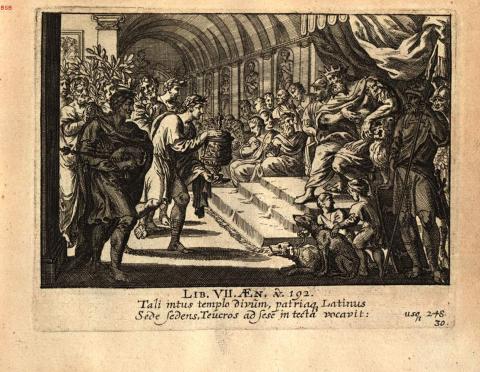Annotations
The Trojan emissary, decorated with olive wreaths and olive branches as a sign of peace, presents gifts to King Latinus enthroned in a hall with his entourage.
Die trojanische Gesandtschaft, die mit Olivenkränzen geschmückt ist und Olivenzweige als Zeichen des Friedens mit sich führt, überreicht dem in einer Halle mit Gefolge thronenden König Latinus Geschenke. (Suerbaum)
Engraving from a German children’s picture-book version of the Aeneid by G. J. Lang and G. C. Eimmart, “A tapestry of Roman virtues as seen in Vergil’s Aeneas and his brave deeds, rendered in sparkling engravings, as illustrations of the remarkable deeds of antiquity, for the common benefit of noble youth,” (Peplus virtutum Romanarum in Aenea Virgiliano eiusque rebus fortiter gestis, ad maiorem antiquitatis et rerum lucem, communi iuventutis sacratae bono, aere renitens) (Nuremburg: J.L. Buggel, 1688), pl. 30.


Ilioneus acts as emissary for the Trojans in the court of Latinus, explaining who they are and why they have come to Italy. He speaks to Latinus from lines 213 through 258. in the background are the statues of Latinus’ palace, described from lines 176 through 191. (Lucy McInerney)